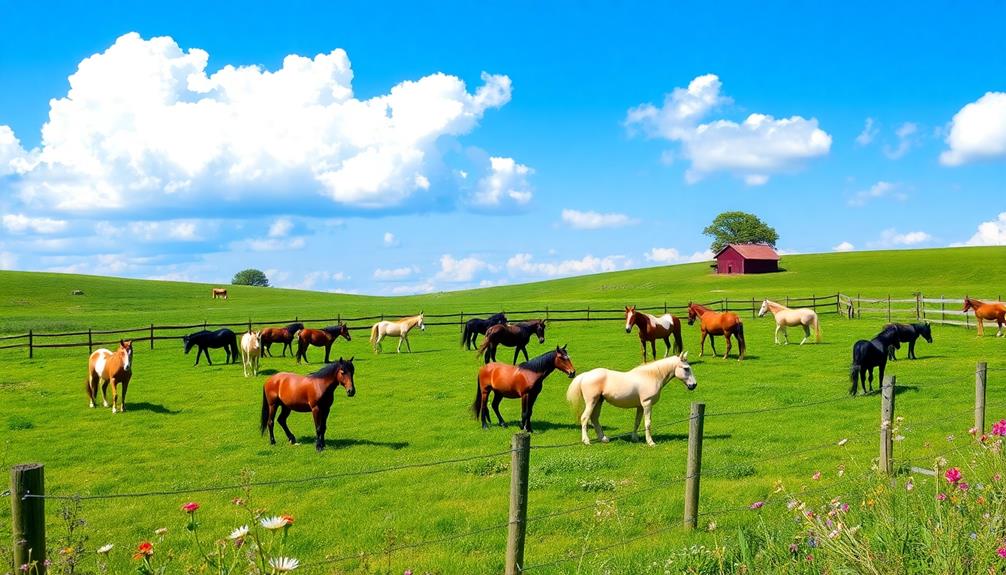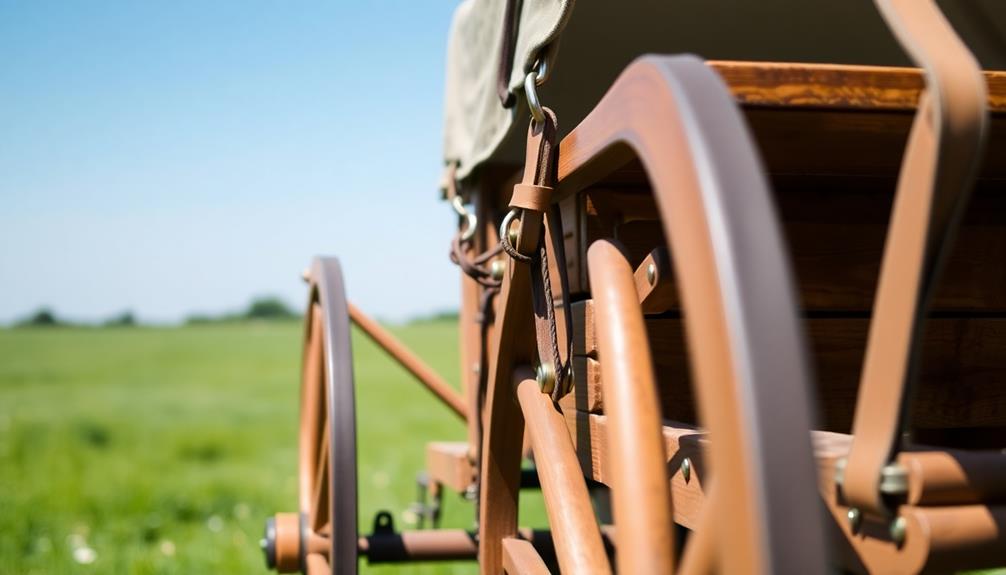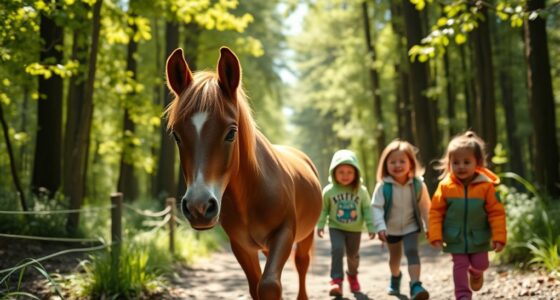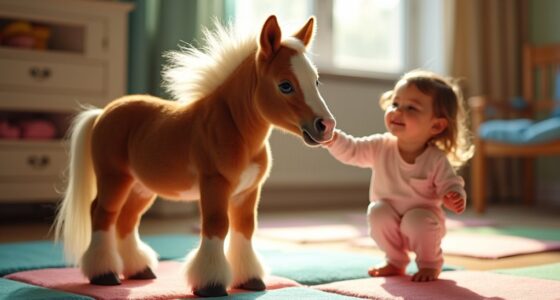Yes, you can housebreak a miniature horse, but it's trickier than training a dog. Miniature horses don't signal when they need to go, so you'll need to establish a consistent routine. Regular feeding times help create predictable bathroom habits, while positive reinforcement encourages them to use designated spots. However, expect challenges, as individual preferences can vary and accidents might happen indoors. Close supervision is essential during training, so you can guide them effectively. To fully understand how to navigate these challenges, there's more valuable insight waiting for you.
Key Takeaways
- Miniature horses can be housebroken, but training requires consistent routines and close supervision due to their lack of signaling for elimination.
- Establishing designated potty spots using soiled shavings helps encourage appropriate elimination habits and reinforces cleanliness.
- Positive reinforcement techniques, such as treats and praise, are effective in motivating miniature horses to use specific areas for relieving themselves.
- Regular feeding times create predictable toileting patterns, aiding in the overall potty training process.
- Individual preferences and varying adaptation rates mean training success can differ, necessitating patience and continuous observation.
Understanding Potty Training in Horses
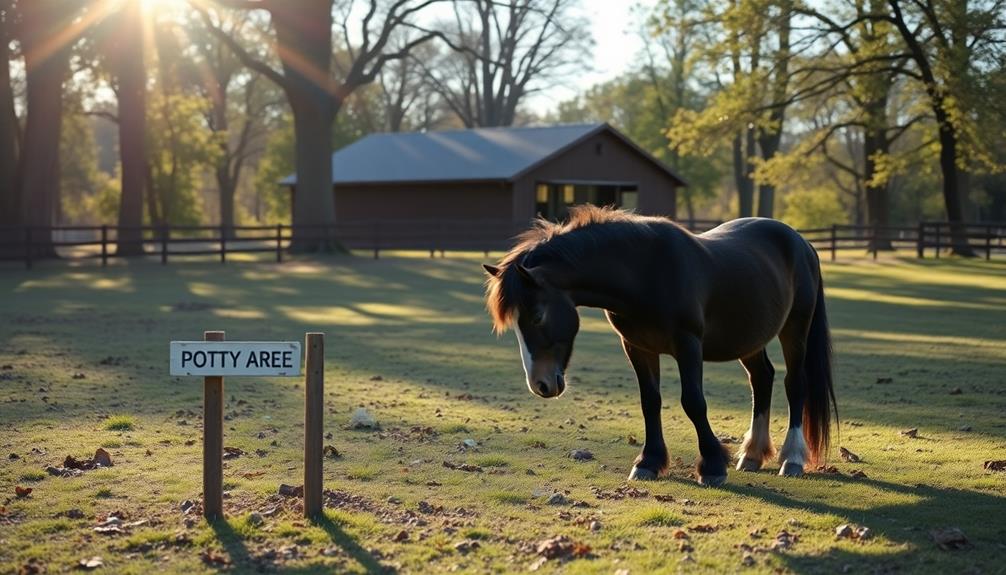
Potty training a miniature horse can be a bit tricky, as horses don't signal when they need to go like dogs do.
You'll need to keep a close eye on your horse to understand its elimination patterns. Typically, a miniature horse will urinate 2-3 times a day and defecate nearly every hour, depending on its feeding and activity routines.
To successfully potty train your horse, it's essential to establish a consistent routine.
Positive reinforcement, like treats and praise, encourages your horse to use designated areas for elimination. Some owners notice their horses develop preferences for specific spots within stalls or paddocks, which can make your training efforts easier.
Challenges of Miniature Horse Training
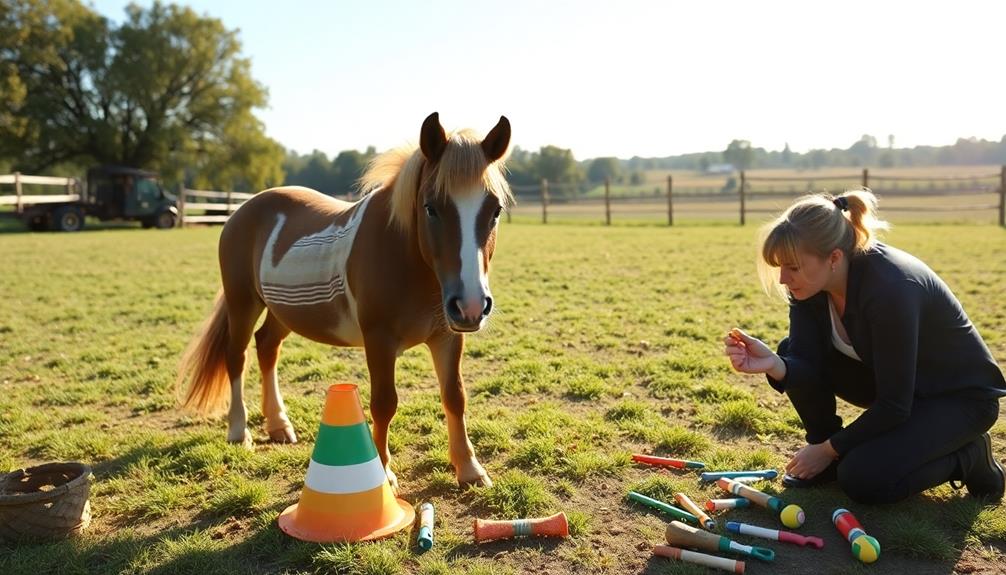
Training miniature horses presents unique challenges that can test even the most patient owners. Unlike larger breeds, miniature horses often have specific spots they prefer for relieving themselves, especially in stalls. This makes it tough to get them potty trained consistently indoors. You'll need to closely observe their habits, as they may instinctively choose a corner or a familiar area to do their business.
With miniature horses producing around 12-25 piles of manure daily, maintaining a clean environment requires diligent management. Some owners report mixed success in encouraging their horses to go outside. One effective method includes placing dirty shavings outside to help them associate outdoor spaces with potty habits.
Moreover, due to their smaller size, these horses often need more supervision during training. If you don't monitor them closely, they're more likely to have accidents.
Techniques for Successful Training

To address the challenges of housebreaking a miniature horse, employing effective techniques can make a significant difference. Start by using positive reinforcement methods. Whenever your horse goes potty in the designated outdoor area, reward them with treats and praise. This encourages them to associate relieving themselves in one place with positive outcomes.
It's essential to establish a routine that aligns with your horse's natural elimination patterns. Typically, miniature horses defecate every hour and urinate 2-3 times daily. By understanding these patterns, you can guide them to the right spots more effectively.
Create designated potty spots by placing soiled shavings outside. This helps your horse recognize these areas as suitable for relieving themselves, tapping into their instinct for cleanliness.
During the initial training phases, monitor your horse closely. Since they don't signal when they need to go, vigilance is key to preventing indoor accidents.
Incorporate observational learning by allowing your miniature horse to see other trained horses using specific areas for elimination. This observation can reinforce desired behaviors, making the training process smoother and more successful.
The Role of Routine in Training
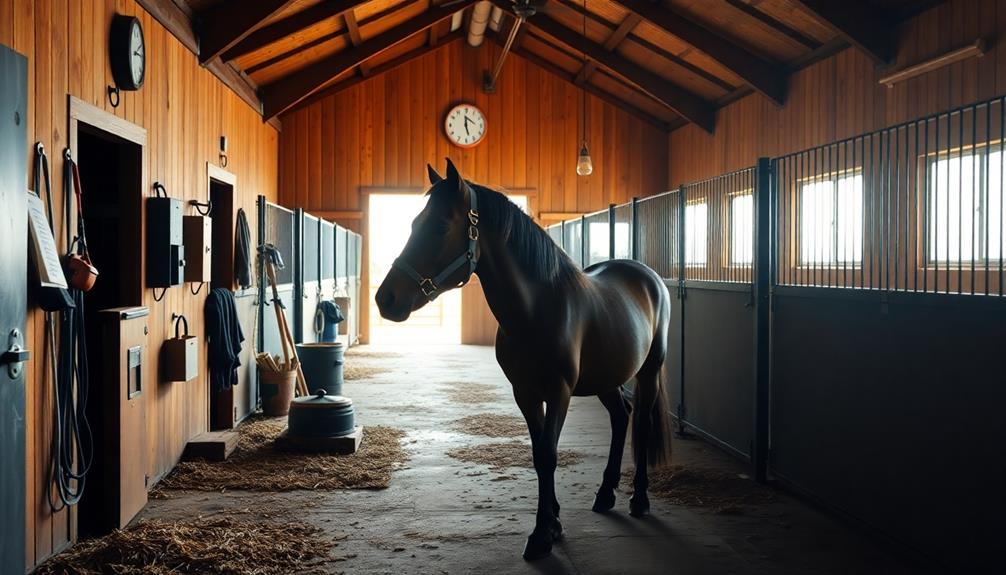
Establishing a routine is essential for housebreaking your miniature horse, as these animals thrive on familiarity and predictability. By creating a consistent schedule, you can greatly reduce stress during potty training. Regular feeding times help establish a reliable toileting pattern since horses often relieve themselves in a routine manner.
Stick to a structured daily schedule to reinforce this behavior.
Incorporating pre-visit routines, like bathing and loading, prepares your horse for expected actions during outings and helps manage potty needs effectively. This approach not only benefits your miniature horse but also mirrors the techniques used with veteran therapy horses, which demonstrate trust and readiness based on established routines.
Daily interactions and monitoring are key. By observing your horse's behavior consistently, you reinforce their understanding of expectations. This clarity aids in successful potty training outcomes, ensuring your miniature horse behaves appropriately in various situations.
Comparing Dogs and Horses
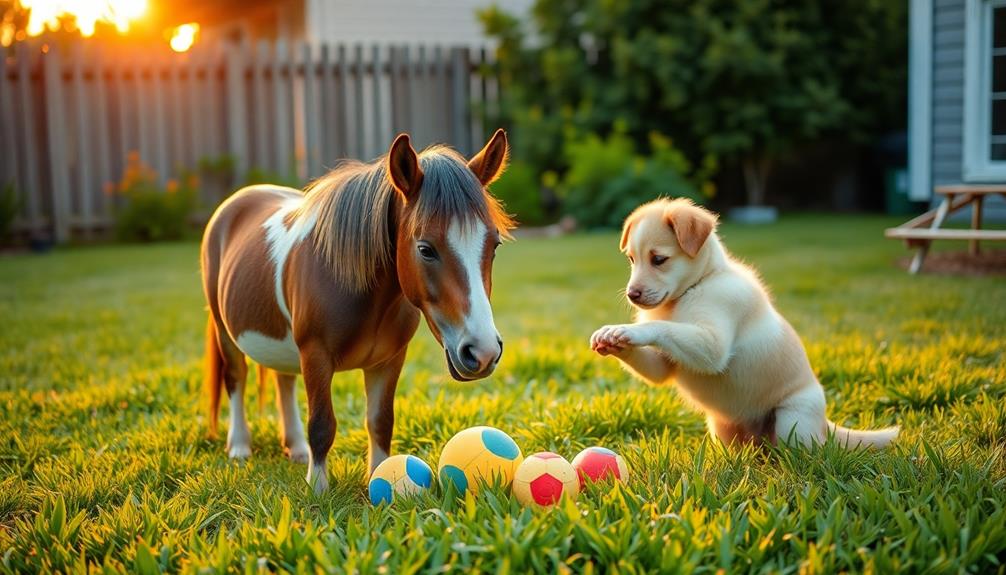
When comparing dogs and horses, it's clear that their potty training methods differ markedly. Dogs often signal when they need to relieve themselves, making it easier for you to anticipate their needs. In contrast, horses don't exhibit such behaviors, meaning you'll need to supervise them closely.
Horses usually have predictable elimination patterns, urinating 2-3 times a day and defecating nearly every hour. This routine requires you to manage their potty habits diligently. While dogs can be conditioned to go outside on command, horses need to be trained to associate specific areas with relief, relying more on their natural instincts.
Unlike dogs, horses are less likely to develop conditioned responses to commands, which makes potty training more challenging. You'll find that horses respond better to environmental cues and observational learning rather than direct signaling.
This individualized approach means you'll need to pay close attention to your horse's habits and preferences. Overall, while both animals can be trained for potty needs, the methods and expectations differ greatly, requiring a tailored approach for each.
Safety Measures During Visits
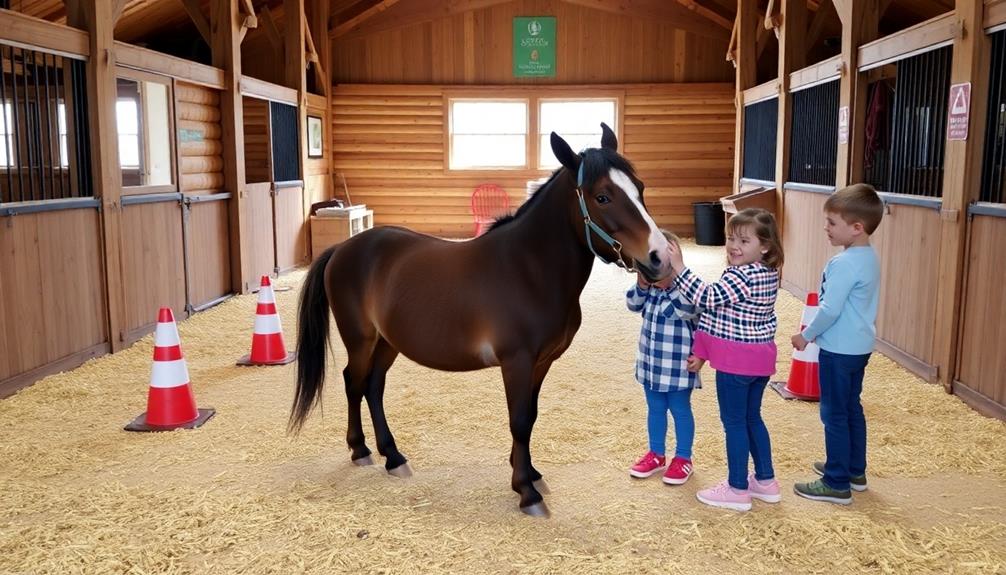
Guaranteeing safety during therapy visits with miniature horses is essential for both the animals and the people involved. Implementing effective safety measures can help create a positive experience while maintaining cleanliness throughout the visit.
Here are some key safety measures to follow:
| Safety Measure | Reason |
|---|---|
| Always use a BunBag | Guarantees cleanliness and prevents accidents |
| Bring cleaning supplies | Prepares you for any unexpected situations |
| Monitor the horse regularly | Helps identify when a horse needs to relieve itself |
| Return all items brought to the visit | Maintains hygiene in public spaces |
| Respect horse behavior | Acknowledges the unpredictability of horses |
Observations From Owners and Experts

As you explore housebreaking your miniature horse, you'll find numerous training success stories that can inspire you.
However, be prepared for common challenges that many owners face along the way.
Experts also have valuable techniques that can help you navigate these hurdles more effectively.
Training Success Stories
Training miniature horses can lead to heartwarming success stories, with many owners sharing their triumphs in potty training. You might be surprised to learn that these little horses have a natural instinct for cleanliness, often preferring to relieve themselves away from their living spaces.
Many horse owners have successfully designated specific areas for their horses, making the process easier. One inspiring story involves a paint mare who trained a younger 6-year-old horse to use a designated spot. This illustrates how positive learning through example can be incredibly effective.
You can also encourage good habits by placing dirty shavings outside the stall, tapping into your horse's instinct to keep their area clean. Establishing a routine and using positive reinforcement techniques have proven essential in achieving successful potty training outcomes.
Owners frequently share their experiences, noting that while accidents may happen indoors, many accept this as part of their horses' well-being. By focusing on these training success stories, you can feel encouraged that housebreaking a miniature horse isn't only possible but can also foster a closer bond between you and your equine companion.
Common Challenges Faced
While many owners celebrate their successes in potty training miniature horses, they also encounter a range of challenges. One significant issue is that miniature horses often have mixed habits regarding indoor and outdoor relief. Some may choose to relieve themselves inside, despite your best efforts to encourage them to go outside. This can be frustrating, especially when you're trying to maintain cleanliness in their living space.
Another challenge arises from the comfort of familiar environments. If the stall remains clean, your horse might feel more at ease using it as a toilet. This can create a cycle where the more you clean, the more likely they're to eliminate indoors.
Additionally, individual preferences vary widely; some horses may quickly adapt to designated spots, while others require more supervision and consistent training.
Community insights suggest that placing dirty shavings outside can help. The smell of their waste may encourage them to explore those areas for relief.
Ultimately, understanding these challenges is key to maneuvering the potty training process and achieving better results with your miniature horse.
Expert Training Techniques
Many owners swear by expert training techniques that can make potty training a miniature horse more manageable. Using positive reinforcement is key; these little horses respond well to treats and praise when they eliminate in designated areas.
Start by observing your miniature horse's natural tendencies. You'll find that many prefer cleanliness and often choose specific spots for relieving themselves, especially if they've dirty shavings around.
Establish a consistent routine, taking your horse out to the same area regularly. Supervision is essential—when you're attentive, you'll catch them in the act and can use cues to reinforce the behavior.
Gradually acclimating your horse to outdoor spaces can lead to success. Take your time and be patient; it's all about building familiarity and trust.
You might also want to mimic behaviors from other horses. If they see peers using a particular spot, they're more likely to follow suit.
Frequently Asked Questions
Can a Miniature Horse Be Housebroken?
Yes, you can housebreak a miniature horse to some extent. By designating potty areas and using positive reinforcement, you can encourage them to relieve themselves in specific spots, both indoors and outdoors. Consistency is key!
Can You Keep a Miniature Horse in Your House?
You can't keep a miniature horse in your house easily. They need space to move, exercise, and relieve themselves. Trying to confine them indoors could lead to hygiene issues and potential damage to your home.
Do Miniature Horses Make Good House Pets?
Imagine a tiny horse prancing through your living room, bringing joy and companionship. Miniature horses can make delightful house pets, but they need your commitment, space, and proper care to truly thrive in your home.
Why Can't Horses Be Potty Trained?
Horses can't be potty trained because they don't signal when they need to go. They tend to follow routines, and their unpredictable habits make consistent training difficult. Supervision is essential to manage their needs effectively.
Conclusion
In summary, housebreaking a miniature horse is definitely possible with patience and the right techniques. By establishing a routine and understanding their unique challenges, you can make significant progress. Isn't it fascinating how similar yet different horses and dogs can be in their training? With dedication and care, your tiny equine companion can learn to be a well-mannered addition to your home. So, are you ready to start this rewarding journey together?

